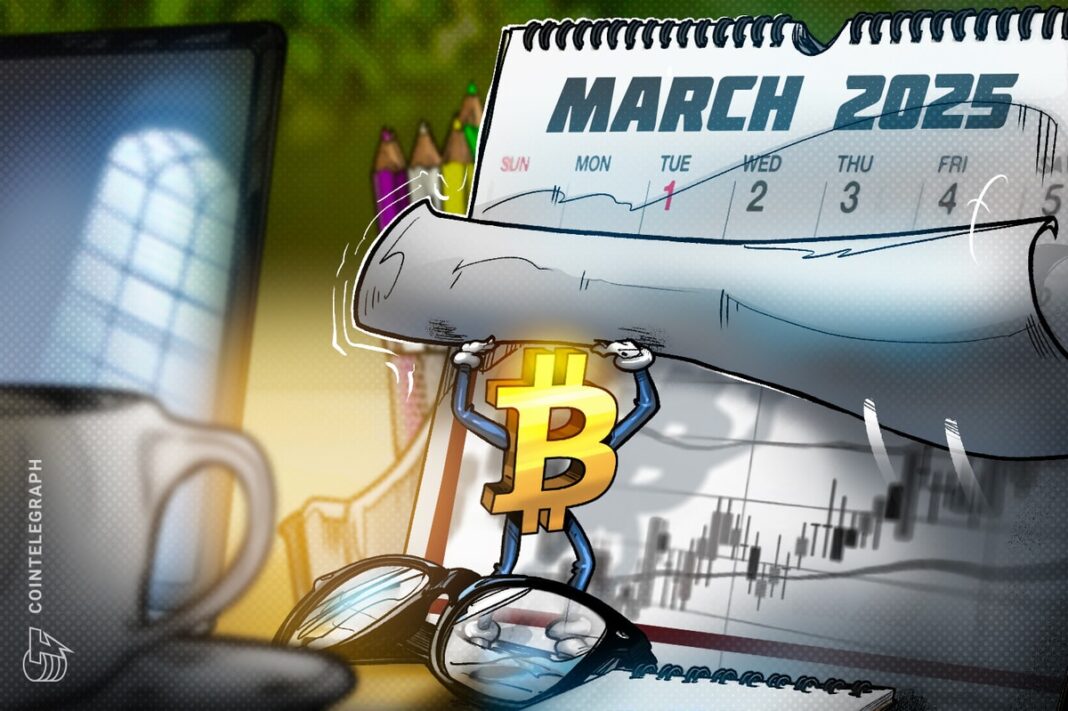March was a rough month for markets — US President Donald Trump’s uncertain tariff policies created volatility in Bitcoin and crypto markets; meanwhile, decentralized finance (DeFi) struggled with security concerns.
Retaliatory tariffs on US goods in China and the European Union hit markets on March 10 and 12, respectively. Amid the tête-à-tête between the United States and its largest trade partners, Bitcoin managed to recover on March 24 to $88,0000 before slumping down again to around $82,000 at the time of writing.
A number of state legislatures are considering Bitcoin- and crypto-related legislation, from bills that would establish a Bitcoin reserve to crypto tax forces and exploring pension fund investment. Such bills moved forward, either in voting or in committee, in 13 US states this month.
The cool-down in memecoin markets has major revenue implications for Solana. After reaching eye-watering highs of $34 billion in January, Solana volumes on decentralized exchanges fell drastically. In March, volumes rarely exceeded $1 billion.
Here’s March in numbers.
Trump’s trade war sees Bitcoin down 5% on the month
The first month of Trump’s administration saw a number of reversals on controversial trade policies that seemed to confuse and exasperate even the president’s political allies.
After a month of delay, tariffs went live on March 4 — 25% on Mexican and Canadian goods, 10$ on Canadian energy and 20% on Chinese goods. Just one day later, Trump’s administration delayed tariffs for auto-makers; on March 6, it announced delays on most Canadian and Mexican goods.
Retaliatory tariffs from China raised the temperature, and on March 12, Trump announced a 24% tariff on aluminum and steel. By March 18, the US Treasury, part of the presidential administration, announced the possibility of negotiable tariff rates per country.
Bitcoin price, along with major stock indexes in the US, were hit as the estimated effects of tariffs changed by the week. On March 24, Bitcoin managed to recover to $85,000, putting it briefly above where it started the month.
The trade war has affected the Trump family’s own crypto investments via World Liberty Financial (WLFI). The fund saw a mixed bag in March, with many of the altcoins in its portfolio, like Mint (MNT) and Tron (TRX), trading at or below where they started the month.
Crypto and traditional financial have been on a downward trend at the end of March as traders brace for “Liberation Day” on April 2, when Trump has promised to levy dollar-for-dollar tariffs on all countries that have tariffs on US goods.
Crypto legislation enacted in two states
Two US states, Utah and Kentucky, enacted legislation in March regarding crypto. Both laws provide definitions for different aspects of digital assets and blockchain technology. They also provide zoning definitions and protections for cryptocurrency miners and create guidelines for businesses to accept cryptocurrencies.
In March, various crypto bills have moved ahead in 13 other states. Three states, Texas, Georgia and Illinois, have introduced new bills in their respective legislatures.
The Illinois act would establish regulations for the industry as well as consumer protections, while Georgia senators seek to create a senate study committee on digital assets and AI.
Texas has been busy. In March alone, it introduced three separate bills that would create an oil-backed stablecoin, allow state officials to invest state funds in crypto and set up a blockchain pilot program for the state’s Department of Information Resources.
Solana ecosystem faces 99% decrease in revenue
A number of high-profile scandals, including one involving the President of Argentia Javier Milei, have begun to scare investors out of the memecoin space.
With most issuances happening on the Solana network, this exodus of traders has seen a 99% decrease in revenues from their high of $15 million on Jan. 19, to just $119,000 at publishing time.
March also saw a continued downtrend in decentralized exchange volume generated onchain and daily active addresses. DEX volumes in March have steadily declined from $3.9 billion on March 2 to $782 million at publishing time.
Magazine: Memecoins are ded — But Solana ‘100x better’ despite revenue plunge
At the end of February, Messari analyst Sunny Shi highlighted the “memecoin economy” composing much of the Solana ecosystem’s value. He added that “a deep contraction in memecoin volumes could cause a cascade of revenue declines.”
The future of memecoins remains uncertain, but Sythnetix founder Kain Warwick told Cointelegraph Magazine that the network is better off for them.
“One of the cool things about the memecoin speculation is it drove a huge investment in infrastructure on Solana,” said Warwick. “Solana as a chain is 100 times better than it was pre-memecoin.”
$22 million in DeFi hacks as analysts raise red flags over security
February saw the largest DeFi hack of all time, with the North Korean state-affiliated Lazarus Group nabbing $1.4 billion from Bybit. March pales in comparison — $22 million was stolen across four hacks (note these are not the same as exploits or short squeezes).
Continuing the Bybit saga, hackers were reportedly able to funnel “100%” of the funds successfully — primarily through THORChain — according to blockchain security firm Lookonchain.
The continued proliferation of expensive DeFi hacks led blockchain sleuth ZachXBT to post on his Telegram channel on March 18 that DeFi “is unbelievably cooked when it comes to exploits/hacks and sadly idk if the industry is going to fix this itself unless the government forcibly passes regulations that hurt our entire industry.”
He said that many protocols have had “nearly 100%” of the monthly fees or volumes derived from Lazarus and “refuse to take any accountability.”
Related: Top 15 crypto conferences to mark your calendar in 2025
Concerns over security and macroeconomic factors aside, the crypto industry has continued to build and congregate at international conferences. March saw six major international crypto conferences in Europe and North America.
On the whole, March was a rocky month. Major coins traded sideways or saw significant losses — Ether (ETH) is down 18% on the month — and economic uncertainty defined the space with the introduction of new tariffs from China and the European Union.
Markets will be put to the test in April as Trump introduces mass tariffs on April 2, dubbed “Liberation Day.” However, past reversals or flip-flops on tariffs mean the effect may not be as pronounced as predicted.
The next month will also see a debate on the US stablecoin law in the House Financial Services Committee. Many in the industry regard the bill as the green light crypto needs to grow in the US.
On April 18, Avraham Eisenberg, who was convicted of fraud and market manipulation in connection with the exploit of the Mango Markets DEX, will face sentencing.
Magazine: Bitcoin ATH sooner than expected? XRP may drop 40%, and more: Hodler’s Digest, March 23 – 29



